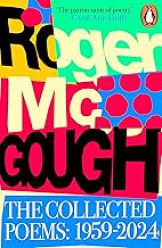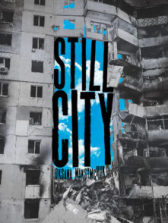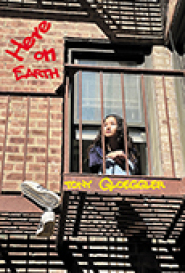
Roger McGough, The Collected Poems: 1959 - 2024, Viking (Penguin Books), 2024,
ISBN: 978-0-241-68100-8, £25.00, 725pp.
Collected editions of any poet constitute a challenge for readers in terms of endurance and assimilation, no matter how much they might like the work of the respective poet. One can feel overwhelmed by the sheer weight of material. This is all the more so in McGough’s case. He has chosen to be completist and to include absolutely everything he has published. Even that aim has been exceeded with a sheaf of unpublished poems. These must surely have been bunged in right up to the wire of publication deadline. The editors at Viking must have had to be very firm with McGough towards the end.
What strikes one immediately is that the poems have been warehoused rather than curated. They are roughly chronological but not consistently so. Therefore one finds oneself wandering down aisles of stacked poems not entirely sure where they fit in the development of his work or when they first appeared although one can sometimes make educated guesses.
To be fair, original titles of some of his collections are flagged up in the contents page, but not alas consistently. The problem is compounded with more recent poems being slotted in with early poems if they happen to fit a particular theme. At the end of the book some haphazard notes are provided. We learn that ‘Sunset’ is ‘probably’ his first published poem (in the late 1950s) but it appears on page 47 after poems like ‘My Busconductor’ and ‘The Icingbus’ which weren’t published until 1967 in Penguin Modern Poets 10. While a further two poems from the same anthology, ‘There’s Something Sad’ and ‘What the littlegirl did’ are placed much later in the book, pages 410 – 411.
With the daunting task of having to engage with such a behemoth of a book, I chose the approach of reading it from beginning to end. This was probably unwise as it turned into a bit of a slog. As I traipsed through this gigantic storage facility I did however enjoy the nostalgic pleasure of revisiting McGough’s classic poems from The Mersey Sound era, which as I have already noted are scattered throughout. McGough was very much a poet hero of mine when as a schoolboy I first discovered his work. The impact upon me of ‘Mother the Wardrobe is Full of Infantrymen’ was profound at the time, the equivalent of Keats first looking into Chapman’s Homer. I have to confess, however, that I gradually lost interest in what he was up to over the years. I suspect I had written him off as not being entirely cool anymore. Occasionally though by chance I’d come across a poem that impressed me such as ‘Defying Gravity’, a poignant expression of grief for a friend dying of cancer, but I did not have a clear idea of his output since his pop poet days.
Certainly my curiosity was to the fore as I proceeded. While there was much I skimmed or that did not ignite for me there were enough gems and divertissements to be found during my tour to make it worth the entry price. He is noted for his light touch and accessibility, almost a faux naivety at times (which goes down very well with children and young adults) but he can also impress with deft flourishes in lines such as “Sheets of ice are nailed to the streets with stars”. Throughout I appreciated his irreverence, inventiveness, which is improvisational at times, and sheer exuberance. There was much also to amuse and entertain along the way, veering between laugh out loud funny as in ‘At Lunchtime: a Story of Love’ and groan- inducing Christmas cracker type wordplay that made me realise what an irrepressible vaudevillian McGough is (no doubt a throwback to his time with The Scaffold).
But quite early on in my traversing of McGough’s Land I encountered a passage that made me recoil. It occurs in the verse novella Summer with Monika which was inspired by McGough catching sight of a poster of the Ingmar Bergman film of the same title. The lines that pulled me up are as follows:
the only thing I’m sorry about
is that we came to blows….
alright, I’m sorry I hit you so hard
but nexttime do as you’re told
The physical aggression is compounded by being coercive. I realise that this would not have attracted much controversy in the 1960s at a time when that beacon of law and order and common sense, Dixon of Dock Green, could address the nation with an admission that he generally turned a blind eye to domestic violence as it would result in too much overtime. What is more perplexing is that in the light of current sensitivities this passage has gone unchallenged, especially given that the 50th anniversary edition of Summer with Monika, which came out in 2017, plays on the whimsicality of the book and refers only to the lovers’ “quarrel”. I am not suggesting that McGough hit a woman for Summer with Monika is clearly a work of fiction and an author should not be held accountable for their characters’ actions but the passage does not sit right in the oeuvre of a poet whose reputation is as cosy as a cardigan.
Overall the collection suffers from its bulk and more editorial consideration should have been given to what was included. However, it’s a credit to McGough that he is a powerhouse in terms of productivity. Clearly, he lives to write. There is always before him the next poem. No sooner has he nailed one, he gives chase scenting another. He seems not to be concerned with quality per se, or even the public rewards that are sometimes bestowed on writers. His modus operandi is neatly summarised in one of his own poems, ‘Sound Advice’: “Once you write a poem/you must write another//To prevent the first/from falling over.”
For me the poems that stand out in The Collected Poems are the classic ones from McGough’s heyday as a pop poet. While there are some poems in the later stages of his career that are as good as the ones in The Mersey Sound, in my view there are none that are better.
David Mark Williams
To order this book click here
David Mark Williams writes poetry and short fiction. He has been shortlisted for the Montreal Poetry Prize and won Second Prize in the New Zealand Poetry Society International Competition. Two collections of his poetry have been published: The Odd Sock Exchange, Cinnamon, 2015 and Papaya Fantasia, Hedgehog, 2018.
Bob Beagrie, Civil Insolencies,
Smokestack Books, 2019,
and Romanceros, Drunk Muse Press, 2024.
Readers of Beagrie’s previous publications will be familiar with his prolific output and sustained energy and enthusiasm for new projects; he is currently working on a series of poems called ‘Hand of Glory’, exploring the occult properties of a severed hand from a felon (housed in a museum at Whitby). In common with other work of his, this has been set to music; you can read more about it and sample poems in my interview with him in Dream Catcher Issue 49.
It may seem odd to be reviewing a book from five years ago alongside a new release, but there is a dialogue of sorts here. Both books dig into a recurring theme in Beagrie’s work; the political, social and cultural significance of protest (in very different contexts) for the extra-ordinary people who take up arms to forge a better world. Civil Insolences places comments from (predominantly) canonical seventeenth century writers into conversation with the lived experiences of the men caught up in the battle of Guisborough, in North Yorkshire, on 16th January 1643. I say ‘predominantly’ advisedly, as Beagrie is always alert to the cyclical nature of history, and Theresa May’s ‘hostile environment’ aspiration of 2012 sits alongside Andrew Marvell and Mikhail Bakhtin in the same epigram. Linking these diverse snippets adds weight to the grim message of ‘The Reaping’, the title of course also recalling the grim reaper. In this collection, Beagrie constantly shows his impressive ability to be simultaneously erudite and creative; giving voice to the ‘common man’ while placing his (and her) experiences in the context of the apparently never-ending battle for justice, equality and hope. The poems are so varied. Several of them break from the tauter framework of lineated verse to present almost as scripts, with named characters (Anne and Jacob, Robert and James) in snatched chats between the acts in the ‘theatre’ of war: these characters are a mix of imagined and historical figures. This is a collection to sit alongside any other war poetry in the canon; a fresh and powerful insight into human perseverance and courage.
Romanceros moves to the European stage, focusing on the efforts of the socialist International Brigade fighting fascism in the Spanish Civil War. As with Civil Insolences, the poems grow out of layers of historical sources, both contemporary to that conflict (Stephen Spender and Carmen Conde) and reminiscences; it was interesting to see Laurie Lee’s comment, so many miles away from his bucolic English childhood depicted in Cider with Rosie. In this collection, more of the context is salted away in endnotes, leaving each poem to fight its own corner. The use of anaphora in ‘Where’s Wally’ both reminds us of the incessant, attritional nature of strife and sacrifice. Each reader will find their own example of a phrase or image which stops you in your tracks. For me it was ‘The Pioneers’ Table’, depicting ‘a table dug from the ground’ around which men sit
speaking in shared tongues
of exile and liberation.
There is a glimpse of the warm camaraderie in sharing
a basket
of freshly baked bread
a flagon of good wine
before the crushing reminder that
… this round simple table
[which,] should it need to,
can double as a grave.
If only the prophetic voices of poets such as Beagrie could penetrate the deafness of the war-mongers in our troubled world. Buy these books; read them as an act of solidarity with the unquenchable might and beauty of creativity.
Hannah Stone
To order this book click here
Hannah Stone is the author of Lodestone (Stairwell Books, 2016), Missing Miles (Indigo Dreams Publishing, 2017), Swn y Morloi (Maytree Press, 2019) and several collaborations, including Fit to Bust with Pamela Scobie (Runcible Spoon, 2020). She convenes the poets/composers forum for Leeds Leider, curates Nowt but Verse for Leeds Library, is poet theologian in Virtual Residence for Leeds Church Institute and editor of the literary journal Dream Catcher. Contact her on hannahstone14@hotmail.com for readings, workshops or book purchases.
Oksana Maksymchuk, Still City,
University of Pittsburgh Press, 2024,
ISBN: 978-1800174023, $18.00. 128pp.
In the poem “Clusters of Roses” Oksana Maksymchuk acknowledges the violence and terrors that scar lives forever but concludes, almost matter-of-factly:
As for life, it says yes
Always—yes
No use
denying it
It’s not exactly a triumphant affirmation, but nevertheless it points to one of the major themes of this collection of poems that take place in the context of the Russian invasion of Ukraine. Of course, the war is ongoing, so it’s hard to feel exultant about much of anything, but the resistance and resilience in the face of relentless destruction are real and vital. Survival is a skill. Maksymchuk writes in “When a Missile Finds a Home”:
I remember the poet who wrote
of a missile
entering his home
For him in Donbas
all the newness is over
and yet
Vasya the cat in his lap
licks his face
just like it used to
Cats, indeed, figure into Still City as images of civilization. In “The Cat’s Odyssey” the protagonist and her family must decide whether and how to protect their cat, as they pack their emergency bag. “Online I view ads of backpacks / with a clear plastic bubble // window….” In “Revisions” an obviously anxious woman fumbles for her keys, but catching sight of her red tabby she feels momentary comfort. Holding the cat to her body,
she closes and locks the door
knows there’s no point:
the whole place will collapse
in a matter of days
under heavy bombardment
Nevertheless, she seeks solace in ruffling its fur, touching its nose. The poem ends: “Imagine, my love, imagine.”
Poems like “Emergency Bag” and “Commercial Break,” which with ironic humor celebrates the tourniquet as a valuable necessity in anyone’s home (“Meet the Tourniquet— / your companion for any adventure…”), as well as others, underscore these readiness preparations required of Ukrainians, the survival mentality, life during wartime.
Survival itself, though, can bring guilt, as she writes in “Survival Syndrome”:
What I couldn’t stand to witness
is my fault
What I fled from—my fault—
making use of my absence
to unfold, unfurl
What I closed my eyes to, what
ears couldn’t bear, what
I dare not utter & can’t recall
Some of the images in the poems are heartbreaking indeed. In “War-Shy” Maksymchuk writes about friends of friends killed on the frontlines, locked up in cellars, buried alive. In “Reconfigured Connections” it’s a cousin hiding in a cellar with a one-year-old infant, her husband in the army.
I read her messages on my phone
then piss into a bottle
set it in the corner of
my own bomb shelter
In “Drone
Footage” a shell strikes a person in the street, and in “Rocket in the Room” it’s a room full of children that gets obliterated. “The Remains of a Universe” vividly describes body bags, one “holding
a hand / and some loose digits.” In “Samurai Cat” a mother is asked to identify the body of her son from the cat tattoo on his foot.
The images, whether experienced firsthand or online, are
devastating. “Algorithmic Meltdown” begins:
I don’t know if the images of
bombings are what you yearn for
in your feed
Scrolling on my phone, I too prefer
funny puppy videos
flowers and minerals, food porn
Instead, I see pictures of ruins
blackened privates exposed
puddles of glass
Somebody’s liver
smeared over the asphalt
like melted ghee
Maksymchuk
goes on to cite Aristotle’s belief that sight is the primary sensory perception that makes sense of things, and she wonders, at the end of the poem, “what do I hope // to unsee?” The images are
forever burned into the brain.
“Still Life of a Person with a Pug” tells the story of a
woman walking her dog who is shot, collapses onto the sidewalk. A neighbor covers the body with a sheet and a matching pillowcase for the pug. A passer-by takes a picture, posts it on social media,
“causing an avalanche of / angry emojis.”
Social media certainly figures into the conflict. Just as the Vietnam War was said to be the first televised war, so twenty-first century horrors are plastered all
over the internet. “Unverified Footage” seems to reflect this anonymous reportage.
War rolls
down the street
like a severed head
a skeletal tumbleweed
The value or utility of poetry in all this? “Puppets of God” starts with an echo of Eliot’s timid Prufrock and goes on to speculate:
There’s hardly time
for the business of poetry
you insisted was vital
But poetry is necessary, just as Still City itself is necessary, to “defy forgetting,” as she concludes “The Orders of Priority” (“World is a poem / before it’s anything else,” the poem begins). In “The Head of Orpheus,” after the legendary poet, Maksymchuk takes on this idea of speaking truth to power (“Power, repulsive as hands of a barber,” the epigraph from Osip Mandelstam reads):
Butchers and tyrants—
they too know poetry
grabbing hold of
the throats that paddle
truth in and out
of lungs, like contraband
Channeling Rilke, whose famous letter asks a young poet why he does write and if he would die if he had to stop, in “Advice to a Young Poem” Maksymchuk notes the poet‘s monumental task of
dealing in recovery of broken
hope, delivery of the forgotten
inessential yet
dear
Her poem “Pure Poetry” addresses the crucial question:
What formal paucity
caused me to weed
around words and phrases
I dreamt essential?
And later in the poem Maksymchuk asks:
Now that the muse
is upon me, how do I take
the measure of business
so unmistakably human?
She goes on to vividly recall a scene of pure inhuman (and yet, paradoxically, quintessentially human) violence, pointless greed, and she further asks, concluding the poem:
Must we write a poem
about this, o Muse? How
do we even begin?
Once begun, how to—
can you?—
go on, etc.
As the poet Ilya Kaminsky writes in his back cover endorsement: “Terrifying, yes, but necessary. Still City is an important book.” Indeed, we should all be grateful for Oksana Maksymchuk’s voice, her words, her “not forgetting.”
Charles Rammelkamp
To order this book click here
Charles Rammelkamp is Prose Editor for BrickHouse Books. His latest collection is The Trapeze Of Your Flesh (BlazeVOX Books).
Stephen Cramer, Shakespeare Redacted,
Shanti Arts Publishing, 2024,
ISBN 978-1-962082-47-1, $24.95, 170 pp.
Although this is not the first book of redacted or blackout poetry, it may very well be the best, and it surely must be the only one devoted exclusively to using all the plays of William Shakespeare as sources. I say “plays” and not “poetry” or “works” because Shakespeare’s sonnets are the primary source texts of Nets, Jen Bervin’s 2003 collection of blackout poems from Ugly Duckling Presse. However, whereas Bervin is very selective about which sonnets to use, Cramer is much more ambitious as he draws upon all 37 plays, and does so twice, sourcing the first and last pages of each play. Here are but two of the 74:
The First Part of Henry the Fourth
[ End of Act 5 ]
That the pursuers took him. At my tent
The Douglas is, and I beseech your grace
I may dispose of him.
King With all my heart.
Prince Then, brother John of Lancaster, to you
This honorable bounty shall belong.
Go to the Douglas, and deliver him
Up to his pleasure, ransomless and free:
His valour shown upon our crests to-day
Hath taught us how to cherish such high deeds,
Even in the bosom of our adversaries.
John I thank your grace for this high courtesy,
Which I shall give away immediately.
King Then this remains, that we divide our power.
You, son John, and my cousin Westmoreland
Towards York shall bend you, with your dearest speed,
To meet Northumberland and the prelate Scroop,
Who, as we hear, are busily in arms:
Myself and you, son Harry, will towards Wales,
To fight with Glendower and the Earl of March.
Rebellion in this land shall lose his sway,
Meeting the cheque of such another day,
And since this business so fair is done,
Let us not leave till all our own be won.
ANOTHER DAY
That the pursuers took him. At my tent
The Douglas is, and I beseech your grace
I may dispose of him.
King With all my heart.
Prince Then, brother John of Lancaster, to you
This honorable bounty shall belong.
Go to the Douglas, and deliver him
His valor shown upon our crests to-day
Hath taught us how to cherish such high deeds,
Even in the bosom of our adversaries.
John, I thank your grace for this high courtesy,
Which I shall give away immediately.
King Then this remains, that we divide our power.
You, son John, and my cousin Westmoreland
Towards York shall bend you, with your dearest speed,
To meet Northumberland and the prelate Scroop,
Who, as we hear, are busily in arms:
My self and you, son Harry, will towards Wales,
To fight with Glendower and the Earl of March.
Rebellion in this land shall lose his sway,
Meeting the cheque of such another day,
And since this business so fair is done,
Let us not leave till all our own are won.
THE FIRST PART OF HENRY THE FOURTH
[Act 1, Scene 1]
King So shaken as we are, so wan with care,
Find we a time for frighted peace to pant,
And breathe short-winded accents of new broils
To be commenc’d in strands afar remote.
No more the thirsty entrance of this soil
Shall daub her lips with her own children’s blood,
Nor more shall trenching war channel her fields,
Nor bruise her flowerets with the armed hoofs
Of hostile paces. Those opposed eyes,
Which like the meteors of a troubled heaven,
All of one nature, of one substance bred,
Did lately meet in the intestine shock
And furious close of civil butchery,
Shall now in mutual well-beseeming ranks
March all one way, and be no more opposed
SHAKEN
King So shaken as we are, so wan with care,
Find we a time for frighted peace to pant,
And breathe short-winded accents of new broils
To be commenced in strands afar remote.
No more the thirsty entrance of this soil
Shall daub her lips with her own children’s blood,
Nor more shall trench war channel her fields,
Nor bruise her flowerets with the armed hoofs
Of hostile pace. Those opposed eyes,
Which like the meteors of a troubled heaven,
Did lately meet in the intestine shock
And furious close of civil butchery,
Shall now in mutual well-beseeming ranks
March all one way, and be no more opposed
So what exactly did you just read? According to the Academy of American Poets, “Erasure poetry, also known as blackout poetry, is a form of found poetry wherein a poet takes an existing text and erases, blacks out, or otherwise obscures a large portion of the text, creating a wholly new work from what remains.” This technique “may be used as a means of collaboration, creating a new text from an old one and thereby starting a dialogue between the two, or as a means of confrontation, a challenge to a pre-existing text.”
Blackout poetry traces its beginnings back to Tristan Tzara and the Dada movement after World War I, but the genre has become particularly popular in this era of social media platforms like Instagram, which handily lends itself to the technique of blocking out text. Cramer, however, is not an “Instagram Poet.” He’s a poet who has authored nine poetry books, edited an anthology of music poetry, and co-translated the works of the Mexican poet, Jaime Sabines. As you can see from the illustrative examples above, Cramer is emphatically in the “collaboration” camp. As he states in the Introduction, “It honestly feels more than a bit subversive to deface the most revered of texts, but the possibility of collaborating with the greatest author of all time was just too great an opportunity to pass up.” How grateful we are that he did not pass up that opportunity, for otherwise we would not have this glorious addition to the short but growing cannon of erasure poetry.
So if you already have Newspaper Blackout (2010) by Austin Kleon, Kin S Fur: Erasure Poems & New Translations of a Tale from the Brothers Grimm (2018) by Margaret Yocom, Erase the Patriarchy: An Anthology of Erasure Poetry (2020) edited by Isobel O'Hare, and The Ferguson Report: An Erasure (2023) by Nicole Sealey, by all means add the brilliant, wise, funny, irreverent, reverent, lyrical, playful, profound Shakespeare Redacted (2024) by Stephen Cramer. And if you do not yet have any “blackout” books in your poetry collection, by all means make Shakespeare Redacted your first. Or only, for it will be the only one you need.
J.R. Solonche
To order this book click here
Nominated for the National Book Award and twice-nominated for the Pulitzer Prize, J.R. Solonche is the author of thirty-six books of poetry and co-author of another. He lives in the Hudson Valley.





